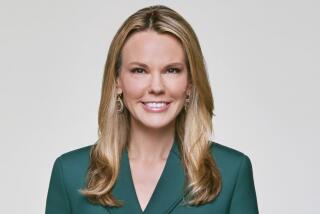Hewitt sets CBS exit date
- Share via
NEW YORK — Don Hewitt, who changed the news business 35 years ago when he created the first prime time newsmagazine, CBS’ “60 Minutes,” agreed to give up his tenacious control of the program he’s been running ever since, but not for another 18 months.
Hewitt, 80, will then take on a new CBS News job that the legendary newsman said will give him an even broader role at the network, which he had complained had been trying to push him out.
Monday’s announcement concludes a complicated succession dance that has been taking place in recent years. CBS management has sought to prepare for the future of its Sunday mainstay, still television’s top-rated newsmagazine and the longest-running prime time show ever, without alienating the man who got it where it is. Under the plan, Jeff Fager, 48, the executive producer of successful spinoff “60 Minutes II,” will replace Hewitt in June of 2004.
After stepping down from “60 Minutes,” Hewitt, a skillful corporate survivor who vowed “to die at my desk,” will take on a new title of executive producer, CBS News, where he will look at new ways of presenting news at a time when all network programming is in flux. He said he’s not sorry to be stepping down. “I was sad a couple weeks ago when I thought I was seeing my last days around CBS, but now I’ll be here for the rest of my life and in my new capacity I’ll have a hand in everything.”
CBS, which has always denied it was trying to force Hewitt out of his “60 Minutes” job, had originally been looking to start a transition as early as this summer. At the same time, it is contemplating a next generation of correspondents to replace, eventually, some of the current crew. Commentator Andy Rooney is 84 while Mike Wallace, who is also 84, has already cut back on his workload this year. As for the rest of the on-air staff, Morley Safer is 70; Ed Bradley, Lesley Stahl and Bob Simon are 61; and Steve Kroft is 57.
In the fall, Hewitt made headlines when he began fretting publicly that he was being pushed out. Monday, he said CBS “realized that there was a lot more in me that was untapped, and they wanted to make sure that if it got tapped it would get tapped by them.”
Hewitt, who had publicly threatened to take his ideas elsewhere, said he “had some conversations” with rival networks but suggested they weren’t serious, and noted: “I would have been very unhappy to go somewhere else and I think [CBS] would have been too.”
CBS News President Andrew Heyward called the transition “a plan Don and I worked out together in the most cordial, civil way” over a lunch earlier this month. Hewitt, whose invention of “60 Minutes” also proved that news could make millions of dollars for a network, acknowledged that his job has also made him rich. (Hewitt’s salary is in the seven-figure range.)
“The whole notion of a conflict was overblown,” Heyward added. The transition, he said, “is very respectful to him; no one got the better of anyone. It’s a good arrangement that provides for a long-term orderly transition,” as well as a “long-term meaningful role” for Hewitt at CBS.
That role, Hewitt said, will be to find “new ways of covering news and come to terms with the new realities of viewing.”
“All the traditional ways of reaching audiences seem for the moment to be out of kilter,” Hewitt said. “It’s happening everywhere. I notice how many Time and Newsweek covers have movie stars. It’s a different world out there and I think I’m young enough to adapt. If you must know, I consider myself younger than most of my contemporaries. I think there’s a stodginess that I’m happy to say has escaped me.”
Hewitt said he doesn’t like all the trends in news, but “you don’t get paid for what you like, you get paid for what the great unwashed American public likes. You get paid for making contact with a world that you may not be in sync with in your day-to-day life.”
Hewitt’s career at CBS, starting in 1948, parallels the history of televised news. He was the producer and director of the first televised face-to-face presidential candidates’ debate, between John F. Kennedy and Richard Nixon, in 1960.
After a stint as Walter Cronkite’s “CBS Evening News” executive producer, Hewitt invented “60 Minutes,” which wouldn’t have a successful rival for another decade, but then was widely copied.
Fager’s first focus, Heyward said, will be to look at how to work in correspondents from “60 Minutes II” into the original program, and maintain the show’s quality during the transition. The two newsmagazines won’t be consolidated, however.
Fager, for his part, said he doesn’t mind waiting 18 months for his new job: “I never really had a timetable in my head. I love what I do.” Paying homage to the man he will replace, he declined to discuss any changes he might be contemplating. “It is a long way away,” he said.
More to Read
The biggest entertainment stories
Get our big stories about Hollywood, film, television, music, arts, culture and more right in your inbox as soon as they publish.
You may occasionally receive promotional content from the Los Angeles Times.










